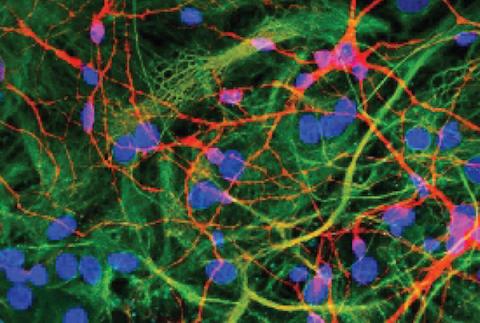Researchers led by Prof Sir David Klenerman at the UK DRI at Cambridge are developing and validating a new blood test, which they hope will be able to detect the earliest signs of neurodegenerative conditions, such as Alzheimer’s disease and Parkinson’s, before symptoms even begin.
Protein aggregation and associated inflammation play key roles in all neurodegenerative diseases and are known to occur early in disease progression. This means that they could be used for early diagnosis, but existing diagnostic tools aren’t sensitive enough to detect them.
To address the problem, Prof Klenerman’s team has developed ultra-sensitive tests that can detect blood-based disease markers. These include harmful proteins such as amyloid beta, tau, alpha synuclein and TDP-43 that clump together into ‘aggregates’ in the brain and cause damage to brain cells, as well signs of inflammation activation within the brain. Individual proteins aggregates are captured, counted, and their size and shape measured and analysed. In people with Alzheimer’s or Parkinson’s, proteins form a greater number of larger aggregates as the disease progresses, so researchers hope the new blood test will be able to detect these changes.
Thanks to funding and support from our partner, LifeArc, the team is now developing and validating a blood test that could be used in clinics across the UK within the next few years.
Protein aggregation is a key feature of neurodegenerative diseases. We hope by developing a method to detect all the key protein aggregates in a blood sample that we will be able to develop a single test for the main neurodegenerative diseases that can be used for early detection and to classify patients for treatment. We are very grateful to our clinical collaborators who are providing us with the appropriate samples to test our new method.
Group Leader
As well as leading to earlier diagnoses, the new blood test would also be less painful and invasive than existing spinal fluid tests and much cheaper than costly brain imaging scans.
Dr Karen Skinner, Chief Portfolio Officer at LifeArc said:
“This research has the potential to transform how we detect and diagnose neurodegenerative diseases. By supporting and investing in projects like this, we hope to speed up the process of turning scientific discoveries into real world solutions for patients facing devastating conditions like Alzheimer’s and Parkinson’s disease.”
The project is expected to conclude at the end of 2026 and, if successful, the research team hopes that the test could be available for widespread use in healthcare settings across the UK in the coming years.
Source: LifeArc

